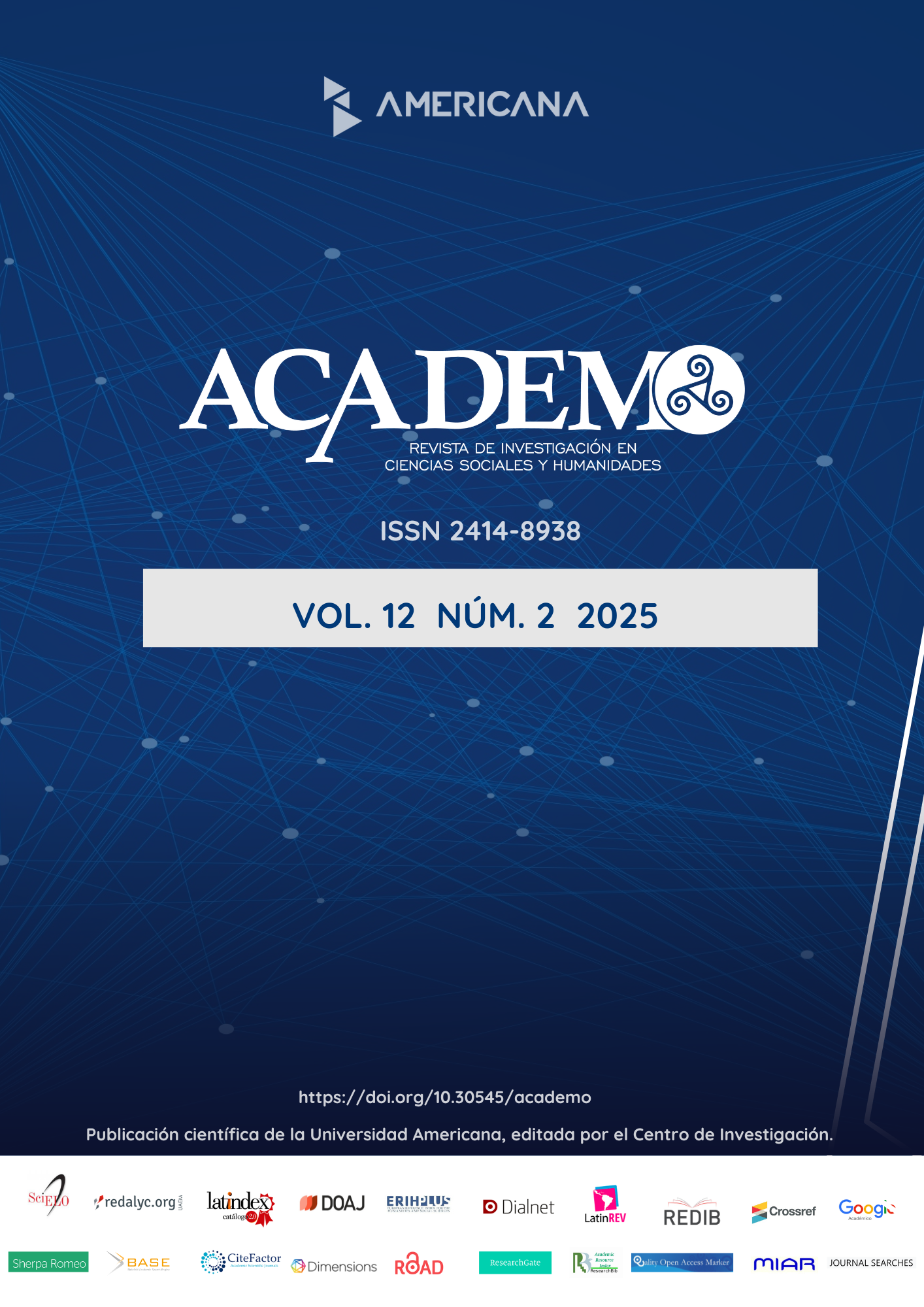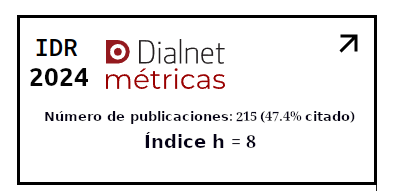Voices of mothers and fathers to ensure well-being and emotional education in childhood
DOI:
https://doi.org/10.30545/academo.2025.n2.1207Keywords:
Emotional development, Parenting Competencies, Parenting StylesAbstract
The article presents research results on the impact that parental skills have on the emotional development of boys and girls in La Araucanía, Chile. The methodology of the study was qualitative, the design used was phenomenological, four mothers and fathers participated. The main results show that mothers and fathers carry out actions that affect the emotional management, assessment and security of the child, through their parental skills, overcoming barriers that hinder the development of positive parenting practices. The main conclusions allow us to maintain that mothers and fathers carry out actions that contribute to the emotional development of their children based on a generational change, to contribute to the comprehensive development of boys and girls.
Downloads
References
APA. (2010). Ethical principles of psychologists and code of conduct. Association American Psychological.
Arias Ortega, K., & Del Pino, M. (2024). Survival experiences of Mapuche parents in multilevel schools in La Araucanía. Journal of Latinos and Education, 1-14. https://doi.org/10.1080/15348431.2024.2413522
Barudy, J., & Dantagnan, M. (2010). Los buenos tratos a la infancia: Parentalidad, apego y resiliencia. Editorial Gedisa.
Baumrind, D. (1966). Effects of authoritative parental control on child behavior. Child Development, 37(4), 887-907. https://doi.org/10.2307/1126611
Barreno, E. M. S., Cusicagua, I. S. M., Pacheco, F. E. M., Paredes, D. K. N., & Urbano, J. A. R. (2024). Impacto del entorno familiar en el rendimiento académico en adolescentes. GADE: Revista Científica, 4(1), 359-381. https://revista.redgade.com/index.php/Gade/article/view/413
Bello, J., Villalva, Z., Hurtado, P., & Moreno, J. (2020). El papel de las competencias emocionales parentales en las conductas internalizantes y el autoconcepto de los niños. Psicogente, 23(44), 166–188.
Bodenmann, G., Cina, A., Lederman, T., & Sanders, M. (2008). La eficacia del programa de crianza triple P-Positiva para mejorar la crianza de los hijos y el comportamiento de los niños: Una comparación con otras dos condiciones de tratamiento. Behavior Research and Therapy, 46(4), 411-427. https://doi.org/10.1016/j.brat.2008.01.001
Bonilla, M., & López, A. (2016). Ejemplificación del proceso metodológico de la teoría fundamentada. Cinta de Moebio, (57), 305-315. https://doi.org/10.4067/s0717-554x2016000300006
Council of Europe. (2006). Recommendation Rec 19 of the Committee of Ministers to member States on policy to support positive parenting. https://search.coe.int/cm/Pages/result_details.aspx?ObjectID=09000016805d6dda
Chinga-Villegas, M. F., & Plua, M. K. (2023). El rol de la familia en la primera infancia. Cienciamatria, 9(1), 1082-1094. https://doi.org/10.35381/cm.v9i1.1118
Debs, M., Kafka, J., Makris, M. V., & Roda, A. (2023). Happiness-oriented parents: An alternative perspective on privilege and choosing. schools. American Journal of Education, 129(2), 145-176. https://doi.org/10.1086/723066
De Graaf, I., Speetjens, P., Smit, F., De Wolf, M., & Cornelis, L. (2008). Effectiveness of the triple P Positive Parenting Program on Parenting: A meta-analysis. Family Relations, 57(5), 553-566. https://doi.org/10.1111/j.1741-3729.2008.00522.x
Fuentes, M., García, O., Alcaide, M., García-Ros, R., & García, F. (2022). Analyzing when parental warmth but without parental strictness leads to more adolescent empathy and self-concept: Evidence from Spanish homes. Frontiers in Psychology, 13. https://doi.org/10.3389/fpsyg.2022.1060821
Fuentes-Vilugrón, G., Lagos, R., González, M., & Castro, R. (2022). Influencia de los estilos de crianza en el desarrollo emocional y aprendizaje de los adolescentes. Revista Infancia, Educación y Aprendizaje (IEYA), 8(2), 17-33.
Franco-Marín, K., Rodríguez-Triana, Z., Ospina-García, A., & Rodríguez-Bustamante, A. (2022). Sentido de las estrategias educativas para la promoción de la relación familia-escuela. Eleuthera, 24(1), 86–105. https://doi.org/10.17151/eleu.2022.24.1.5
Gómez, E., & Muñoz, M. (2015). Manual de la Escala de Parentalidad Positiva (E2P). Fundación Ideas para la Infancia, Chile.
Hernández, R., Fernández, C., & Baptista, M. (2014). Metodología de la investigación. McGraw-Hill/Interamericana Editores.
Hikmatovna, M. N. (2024). Influence of family environment on personal socialization. Multidisciplinary Journal of Science and Technology, 4(3), 164-170.
Infante, A., & Martínez, J. (2016). Concepciones sobre la crianza: el pensamiento de madres y padres de familia. Liberabit: Revista Peruana de Psicología, 22(1), 31-41. https://doi.org/10.24265/liberabit.2016.v22n1.03
Izzedin, R., & Pachajoa, A. (2009). Pautas, prácticas y creencias acerca de crianza… ayer y hoy. Liberabit: Revista Peruana de Psicología, 15(2), 109-115. http://www.scielo.org.pe/pdf/liber/v15n2/a05v15n2.pdf
Juffer, F., Bakermans-Kranenburg, M. J., & Van IJzendoorn, M. H. (Eds.). (2023). Promoting positive parenting: An attachment-based intervention. Taylor & Francis.
Lopezosa, C. (2020). Entrevistas semiestructuradas con NVivo: pasos para un análisis cualitativo eficaz. Métodos Anuario de Métodos de Investigación en Comunicación Social, 1, 88-97. https://doi.org/10.31009/methodos.2020.i01.08
Maccoby, E., & Martin, J. (1983). Socialization in the context of family: Parent-child interaction (4th ed.). Wiley.
Madueño, P., Lévano, J., & Salazar, A. (2020). Conductas parentales y habilidades sociales en estudiantes de educación secundaria del Callao. Propósitos y Representaciones, 8(1). https://doi.org/10.20511/pyr2020.v8n1.234
Mohzana, M., & Murcahyanto, H. (2023). The influence of family interaction on early childhood independence. IJE: Interdisciplinary Journal of Education, 1(1), 53–65. https://doi.org/10.61277/ije.v1i1.10
Prime, H., Andrews, K., Markwell, A., Gonzalez, A., Janus, M., Tricco, A. C., ... & Atkinson, L. (2023). Positive parenting and early childhood cognition: A systematic review and meta-analysis of randomized controlled trials. Clinical Child and Family Psychology Review, 26(2), 362-400. https://doi.org/10.1007/s10567-022-00423-2
Ramos-Galarza, C. (2020). Los alcances de una investigación. CienciAmérica, 9(3), 1. https://doi.org/10.33210/ca.v9i3.336
Rivera, J. P., & Guzmán, A. C. (2024). Trabajo colaborativo entre padres y educadores para fortalecer el proceso de enseñanza aprendizaje de los niños. Revista Científica Multidisciplinaria SAPIENTIAE, 7(13), 16–29. https://doi.org/10.56124/sapientiae.v7i13.0002
Rivera, F. F., & Martínez, M. D. S. (2023). Investigación en parentalidad positiva. Revista de Investigación en Educación, 21(1).
Robinson, C., Mandleco, B., Frost, S., & Hart, C. (1995). Authoritative, authoritarian, and permissive parenting practices: Development of a new measure. Psychological Reports, 77(3), 819-830. https://doi.org/10.2466/pr0.1995.77.3.819
Rodrigo, A., Ortale, S., Sanjurgo, A., Vojkovic, M., & Piovani, J. (2006). Creencias y prácticas de crianza en familias pobres del conurbano bonaerense. Archivos Argentinos de Pediatría, 104(3), 203-209.
Sanders, M., Kirby, J., Tellegen, C., & Day, J. (2014). The triple P-Positive Parenting Program: A systematic review and meta-analysis of a multi-level system of parenting support. Clinical Psychology Review, 34(4), 337-357. https://doi.org/10.1016/j.cpr.2014.04.003
SENDA. (s.f). Prevenir en cuarentena y en familia. Servicio Nacional para la Prevención y Rehabilitación del Consumo de Drogas y Alcohol. www.senda.gob.cl/wp-content/uploads/2020/04/Web-adolecentes-.pdf
Sun, Y. J., Sahakian, B. J., Langley, C., Yang, A., Jiang, Y., Kang, J., ... & Feng, J. (2024). Early-initiated childhood reading for pleasure: associations with better cognitive performance, mental well-being and brain structure in young adolescence. Psychological Medicine, 54(2), 359-373. https://doi.org/10.1017/S0033291723001381
Torío, S., Peña, J., & Rodríguez, M. (2009). Estilos educativos parentales: Revisión bibliográfica y reformulación teórica. Teoría de la Educación. Revista Interuniversitaria, 20. https://doi.org/10.14201/988
Vasiou, A., Kassis, W., Krasanaki, A., Aksoy, D., Favre, C. A., & Tantaros, S. (2023). Exploring parenting styles patterns and children’s socio-emotional skills. Children, 10(7), 1126. https://doi.org/10.3390/children10071126
Vives, T., & Hamui, L. (2021). La codificación y categorización en la teoría fundamentada, un método para el análisis de los datos cualitativos. Investigación en Educación Médica, (40), 97-104. https://doi.org/10.22201/fm.20075057e.2021.40.21367
Yaffe, Y. (2023). Systematic review of the differences between mothers and fathers in parenting styles and practices. Current Psychology, 42(19), 16011-16024. https://doi.org/10.1007/s12144-020-01014-6








